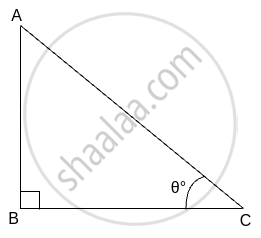Advertisements
Advertisements
प्रश्न
`(sec^2 theta -1)(cosec^2 theta - 1)=1`
उत्तर
LHS = `(sec^2 theta -1)(cosec^2 theta-1)`
=`tan^2 theta xx cot^2 theta ( ∵ sec^2 theta - tan^2 theta = 1 and cosec^2 theta - cot^2 theta =1)`
=` tan^2 theta xx1/(cos^2theta)`
=1
=RHS
APPEARS IN
संबंधित प्रश्न
Prove the following trigonometric identities.
`cos theta/(1 + sin theta) = (1 - sin theta)/cos theta`
Prove the following trigonometric identities.
`tan theta - cot theta = (2 sin^2 theta - 1)/(sin theta cos theta)`
Prove the following trigonometric identities
`((1 + sin theta)^2 + (1 + sin theta)^2)/(2cos^2 theta) = (1 + sin^2 theta)/(1 - sin^2 theta)`
Prove the following identities:
`(1+ sin A)/(cosec A - cot A) - (1 - sin A)/(cosec A + cot A) = 2(1 + cot A)`
If x = r cos A cos B, y = r cos A sin B and z = r sin A, show that : x2 + y2 + z2 = r2
Prove that:
cos A (1 + cot A) + sin A (1 + tan A) = sec A + cosec A
`tan theta /((1 - cot theta )) + cot theta /((1 - tan theta)) = (1+ sec theta cosec theta)`
`(sin theta)/((sec theta + tan theta -1)) + cos theta/((cosec theta + cot theta -1))=1`
If `cos theta = 7/25 , "write the value of" ( tan theta + cot theta).`
The value of (1 + cot θ − cosec θ) (1 + tan θ + sec θ) is
Prove the following identities:
`(tan"A"+tan"B")/(cot"A"+cot"B")=tan"A"tan"B"`
Prove the following identity :
`tan^2A - tan^2B = (sin^2A - sin^2B)/(cos^2Acos^2B)`
If x = a sec θ + b tan θ and y = a tan θ + b sec θ prove that x2 - y2 = a2 - b2.
Without using the trigonometric table, prove that
cos 1°cos 2°cos 3° ....cos 180° = 0.
If x = a tan θ and y = b sec θ then
Choose the correct alternative:
sec 60° = ?
If tan θ = 3, then `(4 sin theta - cos theta)/(4 sin theta + cos theta)` is equal to ______.
Show that `(cos^2(45^circ + theta) + cos^2(45^circ - theta))/(tan(60^circ + theta) tan(30^circ - theta))` = 1
Find the value of sin2θ + cos2θ

Solution:
In Δ ABC, ∠ABC = 90°, ∠C = θ°
AB2 + BC2 = `square` .....(Pythagoras theorem)
Divide both sides by AC2
`"AB"^2/"AC"^2 + "BC"^2/"AC"^2 = "AC"^2/"AC"^2`
∴ `("AB"^2/"AC"^2) + ("BC"^2/"AC"^2) = 1`
But `"AB"/"AC" = square and "BC"/"AC" = square`
∴ `sin^2 theta + cos^2 theta = square`
